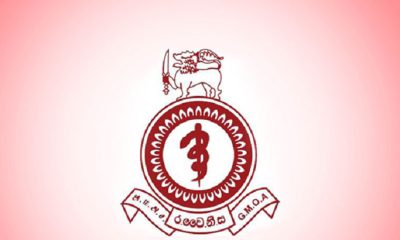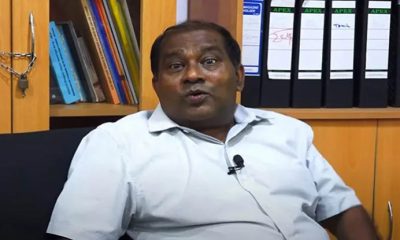News
Innovative water management techniques revolutionising paddy cultivation in Lanka
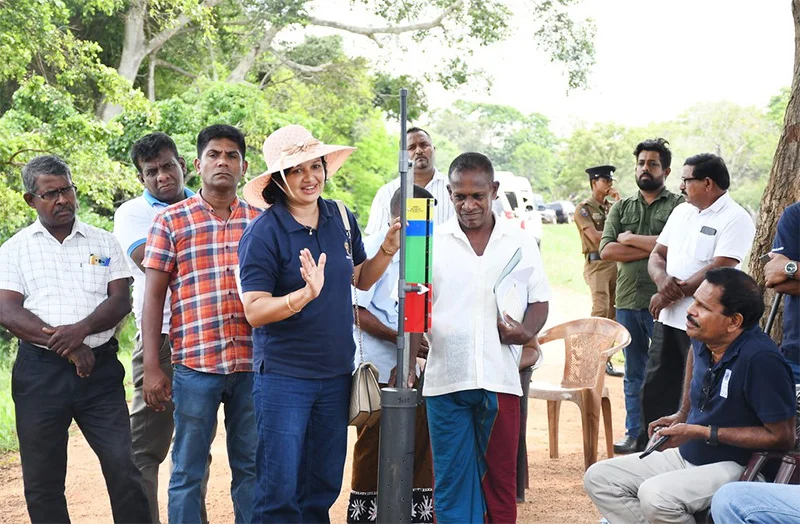
Around 2,500 liters of water are required to produce just one kilo of rice
Around 2,500 liters of water are required to produce just one kilogram of rice, putting immense pressure on Sri Lanka’s water resources, especially during droughts, according to a release from the United Nations Development Programme (UNDP). In response, the Green Climate Fund-financed Climate Resilient Integrated Water Management Project (CRIWMP) is tackling this challenge with an innovative solution: Alternate Wetting and Drying (AWD). This project, implemented by the Government of Sri Lanka with technical support from UNDP, is transforming agricultural productivity through integrated water management. Data shows that AWD reduces water usage by up to 27% and increases cropping intensity from 1.2 to 2.1, allowing farmers to cultivate more frequently, boosting harvests, income, and food security.
For centuries, rice has been the backbone of Sri Lankan agriculture, with over one million hectares of paddy fields cultivated annually, accounting for 37% of the country’s land. However, as climate change accelerates, managing water resources for paddy farming has become increasingly difficult.
The success of CRIWMP goes beyond technology; it empowers farmers with the knowledge to adopt these innovations. The project has worked closely with farming communities, providing training, tools, and climate advisories to help them implement AWD effectively.
Take, for example, the Palugaswewa Farmer Organization. President R.B.M. Anura Wasanththa shared that before the project, they could only fully cultivate their land during the Maha (major) season and a fraction during the Yala (minor) season. With AWD, however, farmers now use simple tools, like water pipes buried in the soil, to monitor water levels and irrigate only when needed. Agro-meteorological advisories help synchronize irrigation with rain, preserving tank water for critical times.
“Earlier, we used tank water for land preparation without understanding ‘on-farm and off-farm’ water management. We weren’t familiar with agro-meteorological advisories either. Now, thanks to the depth gauge, we can accurately calculate tank water levels and follow advisories to make better use of rainwater, conserving a large portion of the irrigation water in the tank,” says Wasanththa. “It’s like saving money in a bank for us.”
As AWD adoption grew, CRIWMP introduced advanced technologies like the Sensor Light System and the Water Level Arrow Marking System. The former uses solar-powered sensors to monitor water levels, signalling farmers when to irrigate, while the latter uses a floating arrow to indicate water levels, enabling farmers to check them from a distance without entering the field.
These innovations have made farmers, like Wasanththa, feel more confident in managing their water resources, with many referring to themselves as “smart” farmers.
Geethika Wijesundara, the Climate Smart Agriculture Programme Coordinator for CRIWMP, calls this shift a paradigm change for Sri Lanka’s paddy farming. “By adopting AWD, farmers now use just 2.9 to 3 acre-feet of water per acre, allowing water saved to be allocated to other field crops, boosting yields and income.”
Secretary of the Palugaswewa Farmer Organization, Susantha, shared that their adoption of AWD allowed them to fully cultivate their Yala land and use only the necessary amount of water. After the Maha season, they had 240 acre-feet of water left in their tank, and with additional rainfall, they were able to irrigate both paddy and green gram. “We still have 30 acre-feet of water left in the tank for our domestic use!” he says.
AWD’s impact extends beyond water conservation. Methane emissions, a major contributor to global warming, have been reduced by 40% in fields using the system. In Sri Lanka, studies show methane emissions in flooded paddy fields average 570 mg/ha, but with AWD, this has been reduced to 325 mg/ha. “This has shown us that integrated water management is crucial in paddy farming,” says Dr. Geethika. “If AWD is adopted across Sri Lanka’s paddy fields, we could cut methane emissions by 245,000 tons annually.”
As CRIWMP continues to roll out innovative technologies, the future of Sri Lankan paddy farming looks brighter, more sustainable, and more resilient. Susantha adds, “I never knew paddy fields emit methane. Thanks to CRIWMP, we’ve learned how to reduce our contributions to global warming.”
Taking AWD even further, the project plans to map soil drainage classes in two village irrigation systems to develop the most efficient crop plans for the Yala season. This will ensure paddy is cultivated according to water availability, while introducing higher-value off-season crops to increase smallholders’ resilience and profitability in a changing climate.
News
GMOA warns of trade union action unless govt. urgently resolves critical issues in health sector
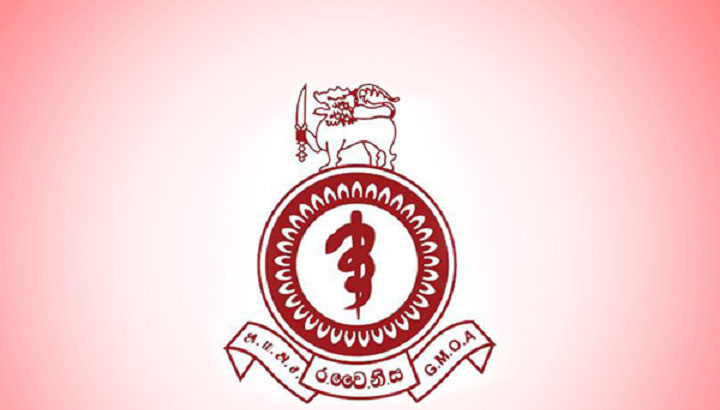
Influx of substandard drugs is of particular concern
The Government Medical Officers’ Association (GMOA) has warned of renewed and intensified trade union action if the government fails to fulfil its promise to resolve the ongoing crisis in the health sector within the next few days.
GMOA Executive Committee member Dr. Prasad Colombage said his association was hopeful that commitments made by the government, including those formally stated by the Minister of Health in Parliament and recorded in the Hansard, would be implemented.
He called for urgent remedial action in view of the influx of substandard medicines into the country, patient deaths linked to such drugs, difficulties faced by doctors in prescribing medicines, and disruptions to patient care services caused by the continued migration of medical professionals. These factors, he warned, had placed patients’ lives at serious risk.
Dr. Colombage said discussions had already been held with all relevant authorities, including the President and the Minister of Health. He expressed hope that swift solutions would be forthcoming based on agreements reached at discussions. However, he cautioned that the GMOA would not hesitate to resort to strong trade union action if tangible progress was not seen in the coming days.
Meanwhile, the Federation of Medical and Civil Rights Professional Associations yesterday (01) handed over a special memorandum to President Anura Kumara Dissanayake, calling for immediate action to resolve the deepening crisis in the health sector.
Federation President, Consultant Dr. Chamal Sanjeewa, said Sri Lanka’s health system was currently facing a severe crisis and had sought an opportunity to hold discussions with the President on the matter.
The memorandum calls for the President’s direct and immediate intervention on several key issues, including the Indo–Sri Lanka health agreement, shortages of essential medicines including cancer drugs, continued allegations surrounding the administration of the Ministry of Health, reported irregularities at the National Hospital, Colombo, and the absence of an internationally accredited quality control laboratory for the National Medicines Regulatory Authority to test medicines. The Federation has also requested a meeting with the President to discuss these concerns in detail.
By Sujeewa Thathsara ✍️
News
Elephant census urged as death toll nears 400

Sri Lanka’s latest elephant census must result in immediate policy action, not remain a paper exercise, Centre for Environmental Justice (CEJ) Managing Director Dilena Pathragoda warned, as nearly 400 wild elephants have already died in 2025 alone amid escalating human–elephant conflict.
With the national elephant population estimated at around 5,879, Pathragoda said the figures would be meaningless unless they shape land-use planning, habitat protection and enforcement.
“As of mid-December, close to 397 elephants have died in 2025, mostly due to shootings, electrocution, train collisions and other human-related causes,” he told The Island. “When deaths continue at this scale, census numbers alone offer little reassurance.”
Official data show that 388 elephants died in 2024, while 2023 recorded a staggering 488 deaths, one of the highest annual tolls on record. Conservationists warn that the trend reflects systemic failure to secure habitats and elephant corridors, despite repeated warnings.
“An elephant census should not end with a headline figure,” Pathragoda said. “If these statistics do not influence development approvals, infrastructure planning and land-use decisions, they fail both elephants and rural communities.”
Elephant populations remain unevenly distributed, with higher densities in the Mahaweli, Eastern and North Western regions, while other areas face sharp declines driven by habitat fragmentation and unplanned development.
Pathragoda said recurring fatalities from gunshots, illegal electric fences, improvised explosive devices along with poisonings and rail collisions expose the limits of short-term mitigation measures, including ad hoc fencing projects.
“The crisis is not a lack of data, but a lack of political will,” he said, calling for binding conservation policy, transparent environmental assessments and accountability at the highest level.
He urged authorities to treat elephant conservation as a national governance issue, warning that failure to act would only see future censuses record further decline of these majestic animals.
“Elephants are part of Sri Lanka’s natural heritage and economy,” Pathragoda said. “Ignoring these warning signs will come at an irreversible cost.”
By Ifham Nizam ✍️
News
CTU raises questions about education reforms

The Ministry of Education has yet to clarify whether school hours will be extended by 30 minutes from next Monday (05) under the proposed new education reforms, Ceylon Teachers’ Union (CTU) General Secretary Joseph Stalin has said.
Stalin told The Island that the Ministry should reconsider the planned reforms, warning that decisions taken without adequate study and consultation could have serious repercussions for nearly four million schoolchildren.
He said the Education Ministry had announced that education reforms would be implemented in Grades from 1 to Grade 6, but it had not said anything about the Grades above 6. This lack of clarity, he said, had created confusion among teachers, parents and students.
Stalin also noted that although learning modules had been issued, students are required to obtain photocopies based on the codes introduced in these modules. However, the Ministry had not revealed who would bear the additional financial burden arising from those costs, raising further concerns over the practical implementation of the reforms.
by Chaminda Silva ✍️
-

 Sports4 days ago
Sports4 days agoGurusinha’s Boxing Day hundred celebrated in Melbourne
-

 News2 days ago
News2 days agoLeading the Nation’s Connectivity Recovery Amid Unprecedented Challenges
-

 Sports5 days ago
Sports5 days agoTime to close the Dickwella chapter
-

 Features3 days ago
Features3 days agoIt’s all over for Maxi Rozairo
-

 News5 days ago
News5 days agoEnvironmentalists warn Sri Lanka’s ecological safeguards are failing
-

 News3 days ago
News3 days agoDr. Bellana: “I was removed as NHSL Deputy Director for exposing Rs. 900 mn fraud”
-

 News2 days ago
News2 days agoDons on warpath over alleged undue interference in university governance
-
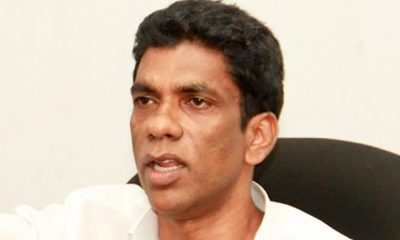
 Features5 days ago
Features5 days agoDigambaram draws a broad brush canvas of SL’s existing political situation




